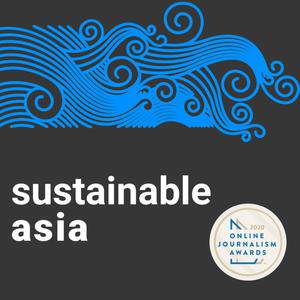
Sustainable Asia
Marcy Trent Long, Sustainable Asia
Stories about Asia and the environment...that you probably haven’t heard yet. A new perspective on how different countries in Asia are tackling a changing planet.
- 25 minutes 28 secondsS16E4: Lab Grown Fish - A Climate Change Solution?
Lab grown fish could be a game changer here in Asia because our waters are becoming more and more overfished. And it turns out marine life in the ocean creates one of the largest carbon sinks on the planet. So losing fish species could disrupt the marine life food chain, putting this amazing ocean carbon sink at risk. But before we talk about lab grown fish as a climate change solution, we first have to understand the history of this overfishing problem in Asia and the importance of fish delicacies to the food culture here.
The episode was produced in partnership with FairPlanet - a global non-profit social enterprise and solutions media organisation founded in 2014 in Berlin with over 200 specialised journalists and experts in 60 countries.
Guests (in order of appearance):
Stan Shea, National Geographic Explorer and Recipient of the Pew Fellowship, Bloom (HK)
Tracy Fu, Hong Kong
Dr. Kenneth Lee, Emeritus Professor, School of BioMedical Sciences, Chinese University of Hong Kong
Carrie Chan, CEO, Avant Meats
Dr. Luxing Liu, Previous Director, School of Chinese Medicine, The University of Hong Kong
Production credits:
Executive Producer: Marcy Trent Long
Co-Host and Producer: Chermaine Lee
Sound Engineer: Estima
Associate Producers: Sam LiXiaoYu, Zack Chiang
Contributing Editor: Jill Baxter
Intro/outro music: Alex Mauboussin
Sign up to find out when new Sustainable Asia seasons are launched
6 May 2024, 2:46 pm - 36 minutes 13 secondsS17E4: INC-4 and Plastic Chemicals
We're back partnering again with the Break Free From Plastic movement to feature NGO advocates in Asia. In this episode. we are going to hone in on one of the big open questions at the April 2024 INC4 talks. How should the treaty deal with problematic plastics and chemicals of concern?
The US EPA recently banned certain PFAS chemicals in drinking water. And Switzerland called for an initial list of problematic plastics to be worked out by year end 2024. With short time left to negotiate the plastics treaty there is a forward movement to finally regulate toxic chemicals in plastics. But we want to take a step back and give more background to what are chemicals of concern in plastic for consumers and advocates alike. Then, at the end of this episode, we'll circle back to how these problematic plastics can be regulated both in and out of the treaty.
Guests:
1. Madhuvanthi Rajkumar, Researcher in environment and climate action and solid waste management at Citizen Consumer and Civic Action Group, or CAG, in India. She represents consumer consituency at the Global Plastics Treaty meetings.
2. Jam Lorenzo, Policy development and research head, Ban Toxics in the Philippines.
3. Jorge Emmanuel, Adjunct professor of environmental science and of engineering at Silliman University in the Philippines. He's also an official member of the Philippine Philippine Treaty Delegation
Production credits:
Host: Marcy Trent Long
Producer: Carol Mang
Intro/outro music: Alex Mauboussin
Sign up to find out when new Sustainable Asia seasons are launched!
We have partnered with Break Free From Plastic (BFFP), headquartered in Asia, to produce this series. BFFP has numerous resources on their website about the Global Plastics Treaty:
You can also refer to: GAIA's treaty page and GAIA’s Asia Pacific treaty page
And check out CIEL's paper on UN procedural tools used to block plastic treaty progress.
22 April 2024, 1:46 pm - 31 minutes 38 secondsS17E3: INC-3 Is Over…What Now?
We have a great new episode discussing the United Nations Global Plastics Treaty from the view of Break Free from Plastic advocates here in Asia. Our guests today have been working for decades to reduce plastic pollution at its source. Just a brief tip though… if you haven’t tuned into previous episodes in this SEASON you might want to … it will catch you up on where we are at with the plastic treaty negotiations!
Well, the third meeting of the Global Plastics Treaty - otherwise called INC3 - ended last November and the Revised Zero Draft of the treaty is out… But there wasn’t a lot of progress during those INC3 meetings.
For this episode, we are partnering with Break Free from Plastic (or BFFP) to get their members' views as we gear up for the next treaty negotiations at INC-4 in April. BFFP has more than 12,000 organizations and individuals around the world working together to demand reductions in single use plastics and advocate for lasting solutions to the plastic pollution crisis.
Guests:
1. Arpita Bhagat - Plastic Policy Officer, GAIA Asia Pacific - based in India. GAIA is a network of more than 1000 organizations from 92 countries, whose vision is a just, zero waste world free from the burden of toxic pollution, where resources are sustainably conserved, not burned or dumped.
2. Semee Rhee - Global Policy Advisor with BFFP in Korea. Semee represents BFFP in the plastics treaty process.
3. Mageswari Sangaralingam is the Honorary Secretary at Sahabat Alam Malaysia based in Penang and is a research officer with the Consumers' Association of Penang for the past 32 years. She represented Sahabat Alam Malaysia - or Friends of the Earth Malaysia - at the INC-3 plastics treaty meeting.
Production credits:
Host: Marcy Trent Long
Producer: Carol Mang
Intro/outro music: Alex Mauboussin
Sign up to find out when new Sustainable Asia seasons are launched!
We have partnered with Break Free From Plastic (BFFP), headquartered in Asia, to produce this series. BFFP has numerous resources on their website about the Global Plastics Treaty:
You can also refer to: GAIA's treaty page and GAIA’s Asia Pacific treaty page
And check out CIEL's paper on UN procedural tools used to block plastic treaty progres.
9 April 2024, 2:41 pm - 31 minutes 36 secondsS17E2: Plastisphere Podcast's How (Not) to Make a Plastics Treaty - Part I: Ambition in a Bracket
Hey Sustainable Asia Listeners! We have some upcoming episodes discussing the United Nations Global Plastics Treaty negotiations that I think you are really going to find interesting. This bonus episode is from one of my favorite podcasts called Plastisphere. It’s run by Anja Krieger in Berlin. Over three episodes, Anja Krieger and Magnus Løvold shed light on how politics can influence the negotiations of a UN Global Plastics Treaty..I am replaying the first episode here…but if you want to hear more just head over to the Plastisphere Podcast.
We’ve covered many of the issues that advocates in Asia want embedded in the plastics treaty. However, given that the treaty needs to be supported by nations globally…it inherently is a political document. And INC-3 proved that. Some countries basically did all that they could to block the progress of the plastics treaty by using procedural games to keep the treaty from ever being signed. So here is episode one of this three part series from Plastisphere Podcast.
From Plastisphere: A podcast on plastic pollution in the environment
What happened at the INC-1 in Uruguay? Recap 1/3.
This year, 2024, is the crucial year for the plastics treaty negotiations. If you haven’t heard about them, the United Nations are working on an international, legally binding agreement to end plastic pollution. It’s been called the most important environmental deal since the Paris climate accord.
Many countries want it to be an ambitious agreement that covers the full lifecycle of plastics, from production to disposal. But some countries are not so keen on this, and they have held up the development of the treaty. How and why exactly did they do this, and is there still hope for a strong and effective international agreement?
To explore this, Anja connected with Magnus Løvold, an expert in Peace and Conflict Studies, and advisor with Lex International and NAIL, the Norwegian Academy of International Law. In his blog „Points of Order“, Magnus describes his observations at the diplomatic meetings he attends.
This is the first of three parts of the conversation. Magnus and Anja will take you back into each meeting of the treaty negotiations - INC-1 in Uruguay, INC-2 in France and INC-3 in Kenya. We’ll talk diplomacy and give you a better understanding of what’s going on on the international stage.
Read our guest's blog: "Points of Order" - independent reporting on multilateral processes, treaty-making and diplomacy" by Magnus Løvold and Torbjørn Graff Hugo: https://medium.com/points-of-order
Episode transcript: https://anjakrieger.com/plastisphere/2024/03/08/transcript-plastic-treaty-making-part1/
Music: Dorian Roy
Cover: Maren von Stockhausen
If you like this show, support the production! Go to https://anjakrieger.com/plastisphere/support/
24 March 2024, 11:09 pm - 29 minutes 13 secondsS17E2: What happened at INC-2?
The second meeting of the International Negotiations Committee (INC-2) had lofty ambitions. But the first three days of these Plastics Treaty negotiations were mired in political antics…making many representatives from Asia feel as though they were back to square one of just talk and no action on dealing with the plastic crisis.
And it seems that two camps have surfaced in these negotiations: Those that want the treaty to be voluntary commitments like the climate change Paris agreement, and those who want a treaty with more teeth and regulations. Any commitments under the global plastic treaty will eventually be adopted as national targets by the signatory countries, and then translated into National Action Plans to implement programs and strategies for meeting these targets. The UN Environment Programme (UNEP) is planning on finalizing the treaty by 2024 over the next few INC meetings…and committed at INC-2 to make the first draft treaty to discuss at INC-3.
So to continue our focus on how reuse, reduce and refill will be highlighted in the treaty negotiations…. we wanted to bring back Marian Ledesma Zero Waste Campaigner with/ Greenpeace Southeast Asia in Manila. Marian attended the INC-22 meetings in Paris, and we wanted to get her thoughts on how that went. We also invited Christina Dixon, Oceans Campaign Leader from the Environmental Investigation Agency to talk in more detail about the action steps and types of language needed to get the treaty moving in the reuse, refill and repair direction.
To wrap up we talk about what you listeners can do to support their efforts at the Global Plastics Treaty negotiations….
Production credits:
Host: Marcy Trent Long
Producer: Carol Mang
Contributing Editor: Jill Baxter
Intro outro music: Alex Mauboussin
Sign up to find out when new Sustainable Asia seasons are launched!
We have partnered with Break Free From Plastic (BFFP), headquartered in Asia, to produce this series. BFFP has numerous resources on their website about the Global Plastics Treaty and the Reuse | Refill | Repair initiative:
https: www.breakfreefromplastic.org plastics-treaty
https: www.breakfreefromplastic.org 2023 04 28 youth-summit-2023-global-plastics-treaty
Video Credits:
UNEP: "A once in a planet opportunity" Inger Andersen, INC-2 | Paris, France
26 June 2023, 4:39 am - 35 minutes 14 secondsS17E1: Bonus Episode: Plastisphere Podcast's Demands for the Plastic Treaty - Science over Profit
A bonus episode about the Global Plastics Treaty from one of my favorite podcasts called Plastisphere. It’s run by Anja Krieger in Berlin, and like Sustainable Asia, Plastisphere really looks at the science behind this plastic waste crisis. I thought listeners would appreciate this episode, as it gives a great background to the Global Plastics Treaty. In the past months, Anja asked scientists and experts to send her their thoughts and demands. In this episode, you’ll get to hear messages from Richard Thompson, Bethany Carney Almroth, Sonia Dias, Tridibesh Dey, Martin Wagner, Trisia Farrelly, Rebecca Altman and Lesley Henderson.
Plastisphere is a research and interview podcast by Anja Krieger, published in the spirit of the gift economy. Please rate and review the podcast and support the production costs via PayPal: plastisphere.earth support
Transcript with links to music and sources: anjakrieger.com plastisphere 2023…13-plastictreaty
Subscribe: www.plastisphere.earth
Theme song: Dorian Roy
Music: Blue Dot Sessions www.sessions.blue
UNEP video 1: www.youtube.com watch?v=28mNomsFsFY
UNEP video 2: www.youtube.com watch?v=N_GSIL0lLDs
Thanks for kind permission, additional audio and images to Miranda Grant, Ahmed Yusuf and the UNEP press team.
Cover art: Maren von Stockhausen
Thanks to: Baldeep Kaur
Follow regular updates on Mastodon: @[email protected]
Follow occasional posts on Twitter, Facebook, Instagram: @PlastispherePod
10 June 2023, 2:14 am - 29 minutes 58 secondsS17E1: Why It's No Longer About Recycling
We need other solutions to the plastic waste crisis. Solutions that involve reduce, reuse, refill and repair here in Asia. And those types of solutions…need to be included in the Global Plastics Treaty negotiations. The Global Plastics Treaty agreement is not a mechanism to control plastic waste. It is a roadmap for the world to control the life cycle of plastics that have come to dominate our natural environment and impact our health in ways we still don’t fully understand.
So that’s what we are going to talk about in this episode. Luckily, I had the opportunity to speak with two incredibly knowledgeable people about this. Marian Ledesma, Zero Waste Campaigner with Greenpeace Southeast Asia based in Manila, who will be attending the INC-2 meetings in Paris next week. Greenpeace Southeast Asia is a Break Free From Plastic member organization, and Marian has a deep knowledge of the plastic crisis here in Asia, as well as how to focus policies so that single use plastic…with all of its health and environmental impacts…can be eliminated from our lives. My other guest Darina Maulana, of Enviu Indonesia based in Jakarta, works with startups in the reuse and refill space in Indonesia. She has a hands-on view of what types of programs and regulations work in megacities in Asia…so that single use plastic consumption can be dramatically reduced…if not totally eliminated!
To wrap up we talk about what you listeners can do to support their efforts at the Global Plastics Treaty negotiations….
Production credits:
Host: Marcy Trent Long
Producer: Carol Mang
Contributing Editor: Jill Baxter
Intro/outro music: Alex Mauboussin
Sign up to find out when new Sustainable Asia seasons are launched!
Resources:
We have partnered with Break Free From Plastic (BFFP), headquartered in Asia, to produce this series. BFFP has numerous resources on their website about the Global Plastics Treaty and the Reuse | Refill | Repair initiative:
https://www.breakfreefromplastic.org/plastics-treaty/
https://www.breakfreefromplastic.org/2023/04/28/youth-summit-2023-global-plastics-treaty/
Video Credits:
UN Agrees to Roadmap for global plastic pollution treaty, The World
The Truth About Plastic Recycling..It’s Complicated, Undecided with Matt Ferrell
25 May 2023, 11:31 am - 3 minutes 17 secondsS17E1: New Season | Global Plastics Treaty Negotiations
The Global Plastics Treaty negotiations kicked off! This is a historic moment for Asia, because after decades of plastic waste washing up on their shores…finally..there may be a path forward. Join us as we talk to BFFP members and other experts about each INC meeting, to find out what YOU can do to support their work at the treaty negotiations.
Production credits:
Host: Marcy Trent Long
Producer: Carol Mang
Contributing Editor: Jill Baxter
Intro/outro music: Alex Mauboussin
Sign up to find out when new Sustainable Asia seasons are launched!
Resources:
We have partnered with Break Free From Plastic (BFFP), headquartered in Asia, to produce this series. BFFP has numerous resources on their website about the Global Plastics Treaty and the Reuse | Refill | Repair initiative:
https://www.breakfreefromplastic.org/plastics-treaty/
https://www.breakfreefromplastic.org/2023/04/28/youth-summit-2023-global-plastics-treaty/
Video Credits: We urgently need a Global Plastics Treaty. Here's why. By Greenpeace International
25 May 2023, 11:29 am - 29 minutes 28 secondsS16E3: Cows | A Climate Stomach Ache
Our focus in this episode is livestock…specifically dairy products made from cows. It turns out enteric fermentation, the cow's digestive process of turning grass into food, contributes to over 40% of global emissions from the livestock supply chain. And the US is a major producer and consumer of beef and dairy products…with China slowly catching up. How are the two global food superpowers innovating ways to reduce greenhouse gas emissions from dairy cows?
Guests (in order of appearance):
Roberta Franco, California Department of Food and Agriculture
Ermias Kebreab, University of California at Davis
Meian Chen, Innovative Green Development Program in China
Liu Ying, Former Director of the Biogas Institute of the Ministry of Agriculture
Li Ying, The Nature Conservancy in China
Matthew Harrison, California Air Resources Board
Production credits:
Executive Producer: Marcy Trent Long
Co-Host and Producer: Chermaine Lee
Sound Engineer: Estima
Associate Producers: Sam LiXiaoYu, Zack Chiang, Lara-Nour Walton
Music Composition: Cole Chiu
Contributing Editor: Jill Baxter
Intro/outro music: Alex Mauboussin
Sign up to find out when new Sustainable Asia seasons are launched
Resources:
This podcast series is part of a Wilson Center China Environment Forum and Ohio State University initiative called Cultivating U.S. and Chinese Climate Leadership on Food and Agriculture. The initiative explores the actions both these “food superpowers” are taking to rein in agri-food greenhouse gas emissions and identifies potential areas of mutual learning and collaboration.
Blogs from the China Environment Forum:
- Soil’s Key Role in Fighting Climate Change in U.S. and Chinese Agriculture: The Wisdom of Dr. Rattan Lal
- Milking the Dairy Industry for Lower Greenhouse Gas Emissions in China
- Rice: A Recipe for Greenhouse Gas Emissions in the U. S. and China?
- The Forgotten Greenhouse Gas: Nitrous Oxide as an Issue for U.S. and Chinese Agriculture
- Farming Our Future Carbon Neutral Agriculture in the US and China
China Environment Forum Webinars:
- Reining in the Methane Hoofprint of Cows in California
- The Blue Planet Turns Green: Algae Fouls Waters as the World Struggles to Grow More Food in a Changing Climate
- Opportunities for Enhanced Near-term U.S.-China Climate Action: The Food System
- Digging into Soil for Food Security and Climate: A Green Tea Chat With Rattan Lal, 2020 World Food Prize Winner
- Mapping China’s Pathway to a Carbon-neutral Food System
- Climate Action Down on the Farm: Food and Climate Nexus Opportunities in China and the US
LOGO images Created by Jennifer Nguyen and Ann Williams
Cartoon tractor is from NatBasil/Shutterstock, farmer from Canva
Video Clip of cow sounds: Cargill Backs Cow Masks to Trap Methane Burps by Bloomberg Quicktake
24 May 2023, 4:13 pm - 30 minutes 44 secondsS16E2: Rice|A Sticky Climate Challenge
Over half of the world’s population eats rice as its staple food. But did you know that rice production also contributes to about 10% of the world's methane emissions? And that methane is 80 times more potent than carbon dioxide in warming the planet? Reining in rice methane is a sticky problem. Different rice types and growing strategies to limit methane often create other problems like lower farming yields. An innovative SRI method developed in Madagascar in the 1960s increases yields and has the promise of reducing greenhouse gas emissions And if that’s not good enough news…Scientists in China, the world's largest rice producer, are collaborating with U.S. researchers to cultivate a hybrid rice that will be a game changer for our ever-warming planet.
Guests (in order of appearance):
Dr. Uphoff, Cornell University
Dr Niu Kunyu, Chinese Academy of Agricultural Sciences
Kenneth Graves, Arkansas Rice Growers Association
Dr Lu Shihua, Sichuan Academy of Agricultural Sciences
Tim Crews, The Land Institute
Dr Fengyi Hu, Yunnan University
Production credits:
Executive Producer: Marcy Trent Long
Co-Host and Producer: Chermaine Lee
Sound Engineer: Estima
Associate Producers: Sam LiXiaoYu, Zack Chiang, Lara-Nour Walton
Contributing Editor: Jill Baxter
Music Composition: Cole Chiu
Intro/outro music: Alex Mauboussin
Sign up to find out when new Sustainable Asia seasons are launched!
Resources:
This podcast series is part of a Wilson Center China Environment Forum and Ohio State University initiative called Cultivating U.S. and Chinese Climate Leadership on Food and Agriculture. The initiative explores the actions both these “food superpowers” are taking to rein in agri-food greenhouse gas emissions and identifies potential areas of mutual learning and collaboration.
Blogs from the China Environment Forum:
- Soil’s Key Role in Fighting Climate Change in U.S. and Chinese Agriculture: The Wisdom of Dr. Rattan Lal
- Milking the Dairy Industry for Lower Greenhouse Gas Emissions in China
- Rice: A Recipe for Greenhouse Gas Emissions in the U. S. and China?
- The Forgotten Greenhouse Gas: Nitrous Oxide as an Issue for U.S. and Chinese Agriculture
- Farming Our Future Carbon Neutral Agriculture in the US and China
China Environment Forum Webinars:
- Reining in the Methane Hoofprint of Cows in California
- The Blue Planet Turns Green: Algae Fouls Waters as the World Struggles to Grow More Food in a Changing Climate
- Opportunities for Enhanced Near-term U.S.-China Climate Action: The Food System
- Digging into Soil for Food Security and Climate: A Green Tea Chat With Rattan Lal, 2020 World Food Prize Winner
- Mapping China’s Pathway to a Carbon-neutral Food System
- Climate Action Down on the Farm: Food and Climate Nexus Opportunities in China and the US
LOGO images Created by Jennifer Nguyen and Ann Williams
Cartoon tractor is from NatBasil/Shutterstock, farmer from Canva
16 May 2023, 5:13 am - 29 minutes 2 secondsS16E1: Soil|The Silent Climate Fighter
Are you aware of the critical role soil plays in the battle against climate change? But 75% of soil is already degraded from unsustainable farming practices...so earth's “living skin” is suffering from a “diet problem,” we are feeding it the wrong menu. In a world of growing political tensions, can the US and China work together to restore this balance?
Guests (in order of appearance):
Rattan Lal, Ohio State University
Kevin Mo, iGDP China
Jessica D’Ambrosio, The Nature Conservancy
Fan Mingsheng, Chinese Academy of Agricultural Sciences
Production credits:
Executive Producer: Marcy Trent Long
Co-Host and Producer: Chermaine Lee
Associate Producers: Sam LiXiaoYu, Zack Chiang, Lara-Nour Walton
Sound Engineer: Estima
Music Composition: Cole Chiu
Contributing Editor: Jill Baxter
Intro/outro music: Alex Mauboussin
Sign up to find out when new Sustainable Asia seasons are launched
Resources:
This podcast series is part of a Wilson Center China Environment Forum and Ohio State University initiative called Cultivating U.S. and Chinese Climate Leadership on Food and Agriculture. The initiative explores the actions both these “food superpowers” are taking to rein in agri-food greenhouse gas emissions and identifies potential areas of mutual learning and collaboration.
Blogs from the China Environment Forum:
- Soil’s Key Role in Fighting Climate Change in U.S. and Chinese Agriculture: The Wisdom of Dr. Rattan Lal
- Milking the Dairy Industry for Lower Greenhouse Gas Emissions in China
- Rice: A Recipe for Greenhouse Gas Emissions in the U. S. and China?
- The Forgotten Greenhouse Gas: Nitrous Oxide as an Issue for U.S. and Chinese Agriculture
- Farming Our Future Carbon Neutral Agriculture in the US and China
China Environment Forum Webinars:
- The Blue Planet Turns Green: Algae Fouls Waters as the World Struggles to Grow More Food in a Changing Climate
- Opportunities for Enhanced Near-term U.S.-China Climate Action: The Food System
- Digging into Soil for Food Security and Climate: A Green Tea Chat With Rattan Lal, 2020 World Food Prize Winner
- Mapping China’s Pathway to a Carbon-neutral Food System
- Climate Action Down on the Farm: Food and Climate Nexus Opportunities in China and the US
LOGO images Created by Jennifer Nguyen and Ann Williams
Cartoon tractor is from NatBasil/Shutterstock, farmer from Canva
3 May 2023, 3:08 pm - More Episodes? Get the App
Your feedback is valuable to us. Should you encounter any bugs, glitches, lack of functionality or other problems, please email us on [email protected] or join Moon.FM Telegram Group where you can talk directly to the dev team who are happy to answer any queries.
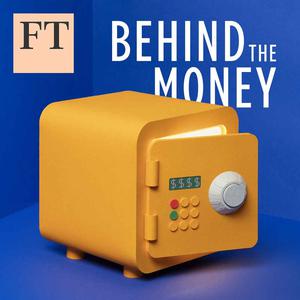 Behind the Money
Behind the Money
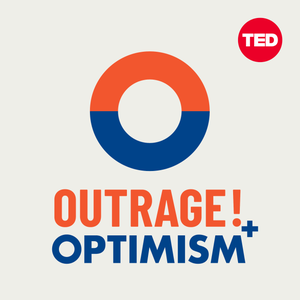 Outrage + Optimism
Outrage + Optimism
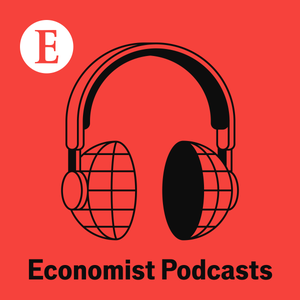 Economist Podcasts
Economist Podcasts
 Volts
Volts
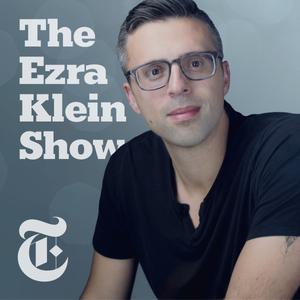 The Ezra Klein Show
The Ezra Klein Show
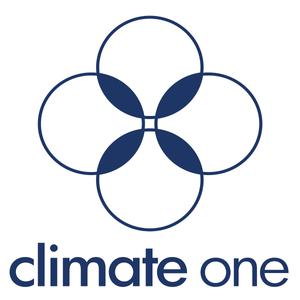 Climate One
Climate One